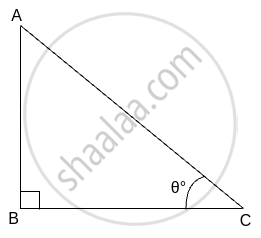Advertisements
Advertisements
प्रश्न
The value of sin2 29° + sin2 61° is
विकल्प
1
0
2 sin2 29°
2 cos2 61°
उत्तर
The given expression is `sin^29°+sin^2 61°`
`sin^2 29°+sin^2 61°`.
=` sin^2 29°+(sin 61°)^2`
`= sin^2 29°+{sin(90°-29°)}^2`
`=sin^2 29°+(cos 29°)^2`
`= sin^2 29°+cos^2°29°`
`= 1`
APPEARS IN
संबंधित प्रश्न
Prove the following trigonometric identities.
tan2θ cos2θ = 1 − cos2θ
Prove the following trigonometric identities.
(sec2 θ − 1) (cosec2 θ − 1) = 1
Prove the following trigonometric identities.
`(tan^3 theta)/(1 + tan^2 theta) + (cot^3 theta)/(1 + cot^2 theta) = sec theta cosec theta - 2 sin theta cos theta`
Prove the following trigonometric identities.
`(1/(sec^2 theta - cos theta) + 1/(cosec^2 theta - sin^2 theta)) sin^2 theta cos^2 theta = (1 - sin^2 theta cos^2 theta)/(2 + sin^2 theta + cos^2 theta)`
Prove the following identities:
cosec4 A – cosec2 A = cot4 A + cot2 A
Prove the following identities:
`1/(1 - sinA) + 1/(1 + sinA) = 2sec^2A`
Prove the following identities:
`(1 + sinA)/cosA + cosA/(1 + sinA) = 2secA`
Prove the following identities:
`(sinA - cosA + 1)/(sinA + cosA - 1) = cosA/(1 - sinA)`
`(cos^3 theta +sin^3 theta)/(cos theta + sin theta) + (cos ^3 theta - sin^3 theta)/(cos theta - sin theta) = 2`
Write the value of ` sec^2 theta ( 1+ sintheta )(1- sintheta).`
If tan A =` 5/12` , find the value of (sin A+ cos A) sec A.
If `sin theta = x , " write the value of cot "theta .`
If tanθ `= 3/4` then find the value of secθ.
If `asin^2θ + bcos^2θ = c and p sin^2θ + qcos^2θ = r` , prove that (b - c)(r - p) = (c - a)(q - r)
Without using trigonometric identity , show that :
`sin(50^circ + θ) - cos(40^circ - θ) = 0`
Prove that : `1 - (cos^2 θ)/(1 + sin θ) = sin θ`.
Prove that:
`(sin A + cos A)/(sin A - cos A) + (sin A - cos A)/(sin A + cos A) = 2/(2 sin^2 A - 1)`
The value of the expression [cosec(75° + θ) – sec(15° – θ) – tan(55° + θ) + cot(35° – θ)] is ______.
(tan θ + 2)(2 tan θ + 1) = 5 tan θ + sec2θ.
Find the value of sin2θ + cos2θ

Solution:
In Δ ABC, ∠ABC = 90°, ∠C = θ°
AB2 + BC2 = `square` .....(Pythagoras theorem)
Divide both sides by AC2
`"AB"^2/"AC"^2 + "BC"^2/"AC"^2 = "AC"^2/"AC"^2`
∴ `("AB"^2/"AC"^2) + ("BC"^2/"AC"^2) = 1`
But `"AB"/"AC" = square and "BC"/"AC" = square`
∴ `sin^2 theta + cos^2 theta = square`
